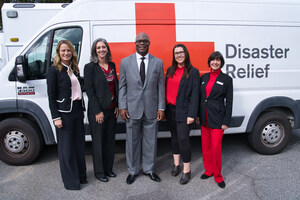80% of youth ages 12-17 think there should be more education about these rules before they are old enough to vote and enlist in the military
WASHINGTON, April 12, 2011 /PRNewswire-USNewswire/ -- A new American Red Cross survey reveals that only 1 in 5 American youth is familiar with the Geneva Conventions, while 4 in 5 think that the U.S. should better educate young people before they can vote and enlist in the military. These rules protect civilians in conflict zones, allow safe passage for the sick and wounded and promote humanitarian treatment of prisoners.
(Logo: http://photos.prnewswire.com/prnh/20090108/RedCrossLOGO)
The results of the survey come 150 years to the day after the start of the American Civil War, during which time the first codified rules of international humanitarian law were adopted. In 1863, President Lincoln commissioned a code of war (known as the Lieber Code) as part of a commitment to uphold American values and principles. With multiple conflicts around the world and civil wars in places like North Africa, these laws are just as relevant today as they were 150 years ago.
The survey demonstrates the need for further education, especially since nearly 7 in 10 youth say they have a relative or a close friend who is a veteran of the armed forces and these rules of conduct protect their loved ones in time of war. Surprisingly, the survey shows that almost half of American youth have never even heard of the Geneva Conventions or international humanitarian law.
"The Geneva Conventions are at the foundation of the work of the Red Cross and are at the core of international humanitarian law. These rules have been adopted by all governments in order to reduce suffering in war," says Bonnie McElveen Hunter, Chairman of the American Red Cross. "With so many conflicts throughout the world, we strongly encourage high schools across the United States to incorporate lessons in the classroom to better inform students on these timely issues."
The Red Cross commissioned two surveys, one of younger Americans between 12 and 17 and another of adults, and the results showed that, in many cases, youth are more inclined to support illegal actions in times of war than adults:
- Nearly 3/5 youth (59%) – compared to 51% of adults – believe there are times when it is acceptable to torture the enemy.
- More than 2/5 youth (41%) believe there are times when it is acceptable for the enemy to torture captured American prisoners, while only 30% of adults agree.
- More than half of youth (56%) believe that there are times when it is acceptable to kill enemy prisoners in retaliation if the enemy has been killing American prisoners, while only 29% of adults agree.
"The United States of America is committed to the Geneva Conventions and to educating our citizens of its provisions and protections. We are at a time in history when the importance of international humanitarian law in general, and the Geneva Conventions in particular, cannot be overstated," said Deputy Assistant Secretary of Defense for Detainee Policy William Lietzau. "It is clear that rules to limit suffering in warfare are as important and relevant today as ever. As our nation marks the 150th anniversary of the beginning of the American Civil War, we are pleased that the American Red Cross is making a renewed commitment to the teaching of these principles that should guide conduct during wars."
The Red Cross and the Geneva Conventions were born when Henry Dunant witnessed the devastating consequences of war at a battlefield in Italy. In the aftermath of that battle, Dunant argued successfully for the creation of a civilian relief corps to respond to human suffering during conflict, and for rules to set limits on how war is waged. Inspired in part by her work in the Civil War, Clara Barton would later found the American Red Cross and also advocate for the U.S. ratification of the first Geneva Convention.
The American Red Cross urges teachers in schools across the country to use the Red Cross curriculum "Exploring Humanitarian Law," which can be incorporated into social studies and history classes. More than 1200 schools in all 50 states already use these resources. Find more detailed information and download the free toolkit at www.redcross.org/ehl.
Details for Surveys:
(1) Telephone survey of 1,019 U.S. adults 18 years and older on February 24-27, 2011 conducted by ORC International. Margin of error is +/- 3.1 percentage points at the 95% confidence level. (2) Telephone survey of 502 U.S. youth 12-17 years old on February 24-27, 2011 conducted by ORC International. Margin of error is +/- 4.4 percentage points at the 95% confidence level.
About the American Red Cross:
The American Red Cross shelters, feeds and provides emotional support to victims of disasters; supplies nearly half of the nation's blood; teaches lifesaving skills; provides international humanitarian aid; and supports military members and their families. The Red Cross is a charitable organization — not a government agency — and depends on volunteers and the generosity of the American public to perform its mission. For more information, please visit www.redcross.org or join our blog at http://blog.redcross.org.
SOURCE American Red Cross
WANT YOUR COMPANY'S NEWS FEATURED ON PRNEWSWIRE.COM?
Newsrooms &
Influencers
Digital Media
Outlets
Journalists
Opted In






Share this article